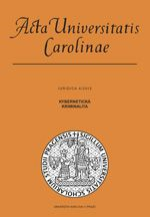Integrační předpisy v rakouském ústavním systému
Constitutional Regulation of the EU Membership in Austria
Author(s): Aleksandra Kustra-RogatkaSubject(s): Law, Constitution, Jurisprudence
Published by: Univerzita Karlova v Praze, Nakladatelství Karolinum
Keywords: constitution; integration provisions; EU law; Austria; constitutional court; judicial review; EU Membership; accession; sources of law
Summary/Abstract: The present elaboration analyzes the constitutional regulation of Austria’s membership in the EU. Austrian legal system has quite specific system of the sources of constitutional law. Austrian constitution in the material (non-formal) sense has been formed not only by the Constitutional Act of 1920, but by a number of other legal acts and even by individual provisions contained in the laws that have gained constitutional status. Because of this specificity of Austrian system of sources of law, constitutional provisions regarding european are very complex. The integration provisions in Austrian constitution (in broad meaning) are: provisions of Federal Constitutional Law on the accession of Austria to the EU enacted on May 5th 1994, provisions of the Title B, article 9 paragraph 2 and article 50 of Constitutional Act of 1920 and finally provisions of other acts of constitutional status as well as certain provisions of ordinary legislation with constitutional status which regulate the Austrian membership in the EU. Article 9 paragraph 2 of the Constitutional Act of 1920 was meant to act as the so-called Integrationshebel. However, finally adopted wording of this provision jeopardized this goal, since is does not permit to transfer competences of states (Länder). Therefore the Title B of the Constitution of Austria had to be introduced. It has enabled the accession to the EU and regulated Austrian membership in the EU. Originally the Title B contained six provisions, but subsequent ratifications of reform treaties required amendments of the original text. Currently Title B contains eleven extremely detailed and complex articles (Articles 23a–23k). Casuistry of this regulation results from the above mentioned peculiarity of Austrian system of sources of law and the federal regime of the country. The consequence of extensive constitutional regulation is the lack of controversies regarding the primacy of EU law in Austrian legal system. This has been confirmed by the case law of the Austrian Constitutional Tribunal, which has also consistently emphasized that it is national courts’ task to apply and ensure EU law in accordance with the principles of the founding treaties and the jurisprudence of the ECJ. With regard to the controversial issue of the constitutional review of the EU law, it should be noted that in 2008 an amendment of Article 50 of the Constitutional Act of 1920 was introduced, which provided for the possibility of constitutional review of the changing treaties. The Austrian Constitutional Tribunal has also examined the constitutionality of national legislation implementing the EU law (mainly directives). However, there is no legal basis to review the secondary legislation of the EU.
Journal: Acta Universitatis Carolinae Iuridica
- Issue Year: 59/2013
- Issue No: 4
- Page Range: 265-282
- Page Count: 18
- Language: Czech

